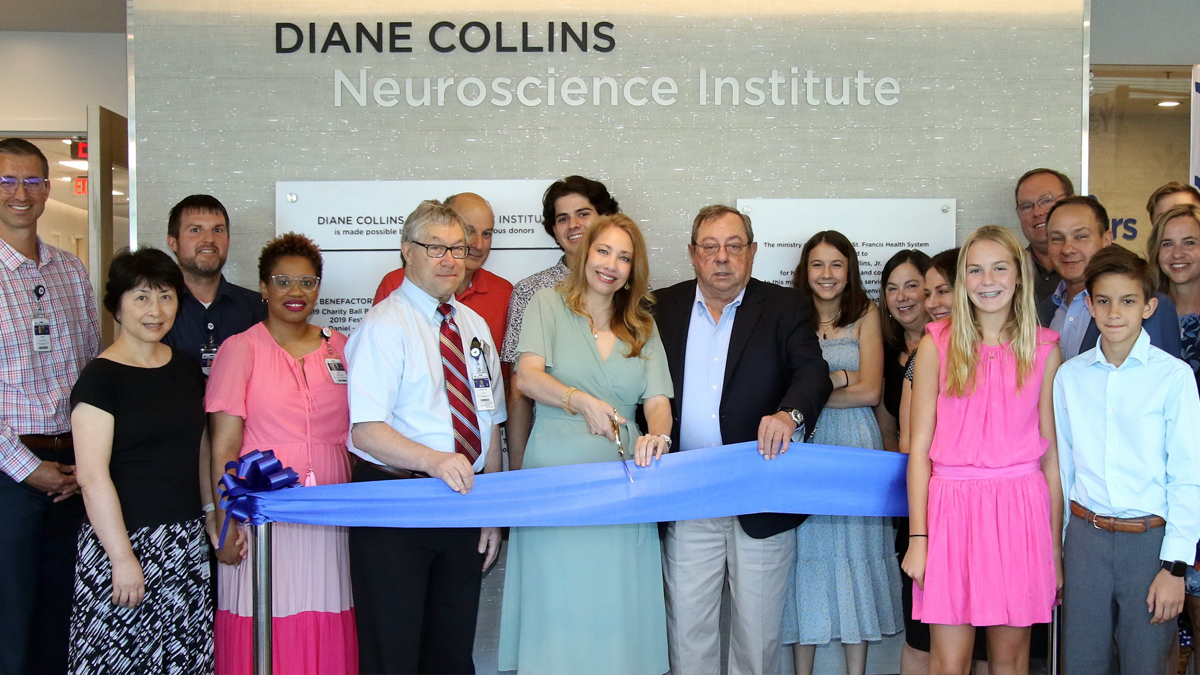Dr. Kathleen Woschkolup, director of neurology at Bon Secours St. Francis Health System, said the opening of the new Diane Collins Neuroscience Institute in Greenville was a dream come true.
That’s the impression other physicians and therapists, as well as patients, may have about the $8 million institute that opened in early June. The reason? The Bon Secours St. Francis Health System center allows patients to receive various, if not all, aspects of their individualized neurological care at one convenient location.
The Institute is located on the third floor of the medical office building on the Bon Secours St. Francis Millennium campus. The five physicians who moved to the center are from the Bon Secours Neurology-Eastside practice. In this new space, patients now have access to a dedicated speech pathologist, neuro-trained physical therapist and other services they can benefit from, based on their needs.
Dr. Woschkolup said, “Physicians will be able to collaborate on their care of patients because various specialties are located in one building, with more medical physicians and therapists likely to join the team at the center. We can pool our medical expertise to quickly benefit our patients and cut down on their travel and need to make appointments on different days. For instance, a patient can see me, then go to occupational therapy and then to a speech therapist, all in one day.”
Wayne Fraleigh, Bon Secours Medical Group chief operating officer, mentioned what he termed “one-stop shopping” when speaking of the Institute’s purpose.
“We were able to create a one-stop shop to centralize neurological care, making a destination place for patients seeking comprehensive treatment for conditions affecting the brain, spine and peripheral nervous system. Our team of highly-skilled health care experts now has spaces created specifically with these patients in mind so they can offer treatment in an environment that promotes healing,” he said. “This program expansion is a renewal of our commitment to raising awareness and acting as a frontline resource for those suffering from neurological disorders.”
The services offered by the Bon Secours Diane Collins Neuroscience Institute extend throughout the entire building. Imaging, including a CT scanner and MRI, are located on the first floor. The HealThy Self gym on the second floor now has a boxing area; this activity has been shown to improve gait stability, reduce the risk for falls and improve overall movement and health in patients with Parkinson’s disease. The second floor also soon will house an infusion center for non-oncological patients, as well as a dedicated set up to simulate activities of daily living that patients may need help mastering following a stroke or while dealing with other neurological disorders.
The Bon Secours Diane Collins Neuroscience Institute began as a grass-roots effort by members of the community who witnessed the benefit of comprehensive care themselves or for their loved ones. In fact, the family of the Institute’s namesake provided a generous gift that made it possible for this project to take off. Diane Collins was known for her volunteer work throughout the Upstate and spent many years living with Parkinson’s disease.
“This would not be possible without the generosity of donors who so believe in the impact that will be made by bringing this place of healing and hope to fruition,” said Erik Whaley, president of the St. Francis Foundation. “We are humbled by those who stand in the gap for those who suffer from neurological disorders, and know the impact made by the care provided for our patients and family members will be tremendous.”
Disorders affecting the brain and central nervous system, which include migraines, strokes, dementia and dystonia, are complex. At Bon Secours, a board-certified team of neurology experts combines compassionate care with the most advanced medical treatments to help patients with neurological disorders maintain the highest quality of life.
The Institute, as well as the existing medical services Bon Secours offers, have been utilized by patients from a large area.
“We draw patients from North Carolina and along the Lowcountry,” said Dr. Woschkolup. “I had a patient who had moved to Pennsylvania who came back to see me just recently.”
The new centralized approach makes Bon Secours a convenient medical facility.
“In the past, patients needing several of the services we offer might not have been able to access that care because of specialists having been located in different offices,” said Dr. Woschkolup. “The new Institute allows for patients to make appointments easily and quickly and, in some instances, be able to segue from an initial physician to other clinicians and therapists, perhaps in the same day.”
By John Torsiello
